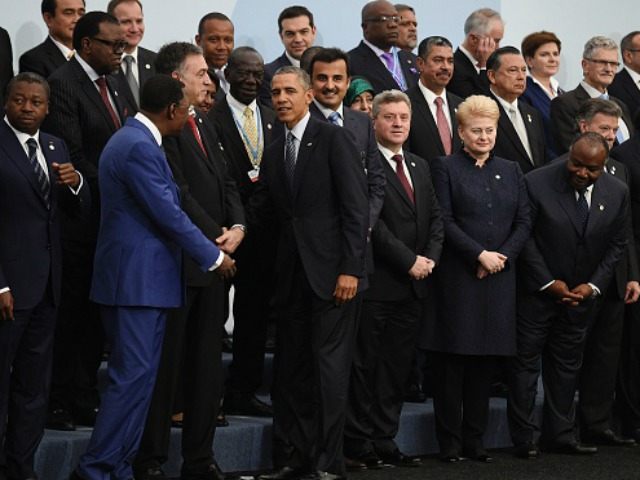President Obama is at a UN conference this week aimed at tackling global warming.
Leading up to the meeting, the president recently announced a “Clean Power Plan” (CPP) to curb carbon dioxide emissions from America’s power plants. Such an effort may bolster the president’s credentials as a climate leader. But his plan requires a staggering transformation of America’s power sector that is simply too costly to implement.
Under the direction of the Environmental Protection Agency (EPA), the president’s new CPP rules mandate a 32 percent cut in carbon dioxide emissions from U.S. power plants by 2030. To accomplish this, the plan would shut down roughly 40 percent of America’s coal-fired power generation. And the end result of such a massive undertaking would be— get ready for this— a theoretical lowering of global temperatures by 0.02 degrees Celsius by 2100.
Essentially, President Obama’s plan will accomplish nothing to solve global warming. But while the president’s commitment might impress climate change advocates, the overall price tag should greatly trouble America’s working families.
According to a new study by Energy Ventures Analysis (EVA), by 2030 the CPP will have Americans paying $214 billion more for wholesale electricity. While 46 states will experience double-digit increases in wholesale electricity prices, 16 states will face an even greater price increase of 25 percent or more.
As EVA reports, the bills for the CPP will officially start to come due in 2022, when consumers will have to pay an additional $15 billion a year for electricity. By 2030, they’ll be paying $31 billion more each year – an overall increase of 21 percent. And then there’s the cost to replace the current fleet of clean-coal power plants— an additional $64 billion expense that will undoubtedly be passed on to consumers.
EPA says replacing affordable sources of electricity (like coal) with far costlier sources (like wind and solar) will somehow lower electricity costs, but the numbers just don’t add up.
Coal currently generates about 40 percent of the nation’s electricity, whereas intermittent sources including wind and solar currently contribute less than 5 percent. The CPP would impose a nationwide mandate to generate 28 percent of electrical power from wind turbines and solar panels by 2030. Accomplishing this would require the construction of not only 125,000 giant new windmills but also hundreds of additional gigawatts of conventional back-up plants. And then there are the thousands of miles of new high-voltage transmission lines that will be needed to deliver this alternate power.
Most American families expect, and many low-income families rely on, affordable electricity to balance their budget. But it’s exactly this affordable, coal-generated electricity that the administration now wants Americans to give up.
Overall, the cost of the CPP falls hardest on low-income and middle-class families. Today about half of all American households pay close to 20 percent of their disposable income on energy-related expenses. The CPP will force them to pay more. And so, the same federal agency that claims global warming is hurting the world’s poor will now be hurting more of America’s hard-working families in an effort to stop global warming.
Essentially, the CPP will accomplish nothing meaningful in terms of global warming, even as it imposes billions of dollars in higher electricity costs here in the U.S. America’s consumers should not have to pay for such a poorly conceived plan, and states should reject it.
Terry M. Jarrett is an attorney with Healy Law Offices, LLC in Jefferson City, Mo., and a former commissioner of the Missouri Public Service Commission.

COMMENTS
Please let us know if you're having issues with commenting.